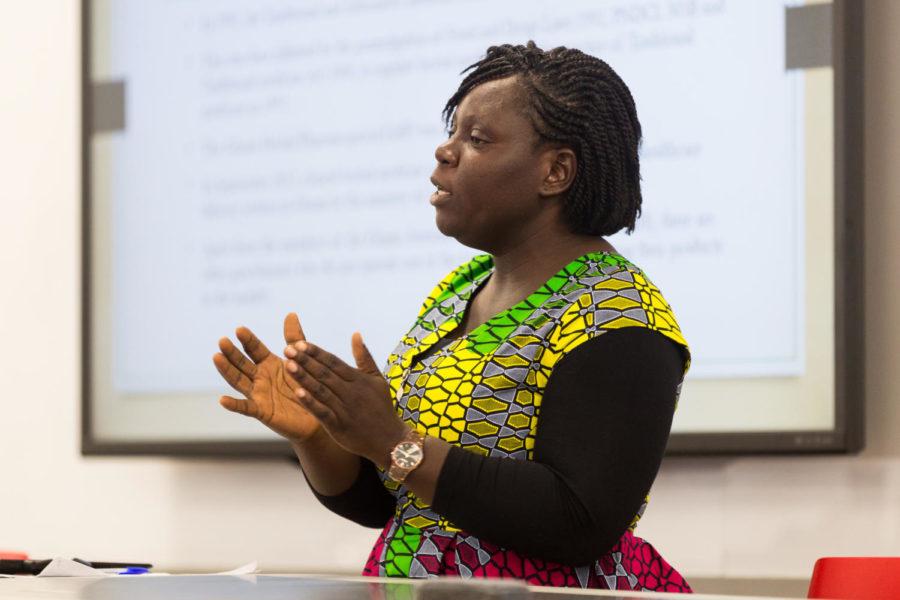Lecturer discusses Ghanian infomercials negative effects on Ghanian women
Mikinna Kerns/Iowa State Daily
Theresah Patrine Ennin, a senior lecturer at the University of Cape Coast in Ghana, gives a lecture on Traditional Medicine and the Commercialization of Women’s Bodies in Pearson Hall Nov. 26. In Ghana Ennin teaches African literature, critical theory, research methods and communicative skills.
November 26, 2018
A lecturer expressed the dangers of infomercials to the health of Ghanian women, though most believe they only have positive effects.
Theresah Patrine Ennin, presented “Traditional Medicine and the Commercialization of Women’s Bodies” on Monday. Ennin is a senior lecturer of African literature at the University of Cape Coast in Ghana. She teaches African literature, critical theory research methods and communication skills.
Her research focuses on gender representation in African media. Specifically, the way women are portrayed in infomercials.
Ennin said that infomercials have an affect on humans, but some people don’t believe this.
“Overtime, it affects the way you see yourself and it affects the way you relate to the world around you,” Ennin said.
Traditional medicine has been around for a long time. Some traditional medicines used are herbs, flowers and roots which are used to cure illnesses in many communities, including Ghana.
The practice of traditional medicine is passed down from father to son. The father would be a practitioner and usually well known in the community as somebody who would use herbs to treat illnesses. Once the patient was healed, they would bring the practitioner a gift to say thank you.
“I remember I talked to a friend recently, who is a woman, who knows a lot about [traditional medicine],” Ennin said. “I asked her, ‘how did you learn this, because nobody in your family practices this’ and she said, ‘when I had my babies, I went to this practitioner and for a fee, he showed me how to use some of these herbs to treat my children.”
Ennin said now there are many people who have access to the knowledge of traditional healing, some hospitals in Ghana even have a part of the hospital that practices traditional medicine.
“You don’t know what is in your medicine anymore, they tell you there are parts of this and that tree but they’re being pounded and mixed with some other things,” Ennin said.
This forces you to believe the ingredients that are printed on the label.
Ennin argued that infomercials of indigenous Ghana medicine are commercializing women.
“Women are seduced into being an ideal sexual object that is desired by a man,” Ennin said.
She said the message for women is to consume this to look like the ideal woman in society.
In a commercial she showed during the lecture, women were talking about the benefits to their sexual health after taking this medicine. Women claimed after drinking the medicine their vaginas were tighter and had a better ora.
Other products Ennin talked about were weight-loss capsules, fertility capsules and skin lightening soap.
Although, many companies have products for men and women to help their sexual performance. Some products for men are medicines mixed with alcoholic beverages.
“In an informercial you see a woman come in talking to the husband and telling the husband he has been doing very well in bed and the man said yes ever since you have started taking the medicine your performance has improved,” Ennin said. “Then they were very happy with each other.”
The infomercials are training Ghanian consumer’s minds to want more than beyond normal.
“There is so much thought into what is presented to us everyday that we need to be very careful of what we see, what we read and what we are listening to,” Ennin said.
















